Evaluation of Cybercrime from the Perspective of Ethical Theories
VerifiedAdded on 2023/06/05
|9
|2127
|104
AI Summary
This paper evaluates the act of cybercrime from the perspective of different ethical theories. It discusses the negative consequences of cybercrime and how it violates the rules and regulations of the society. The paper concludes that cybercrime is not an ethical practice.
Contribute Materials
Your contribution can guide someone’s learning journey. Share your
documents today.
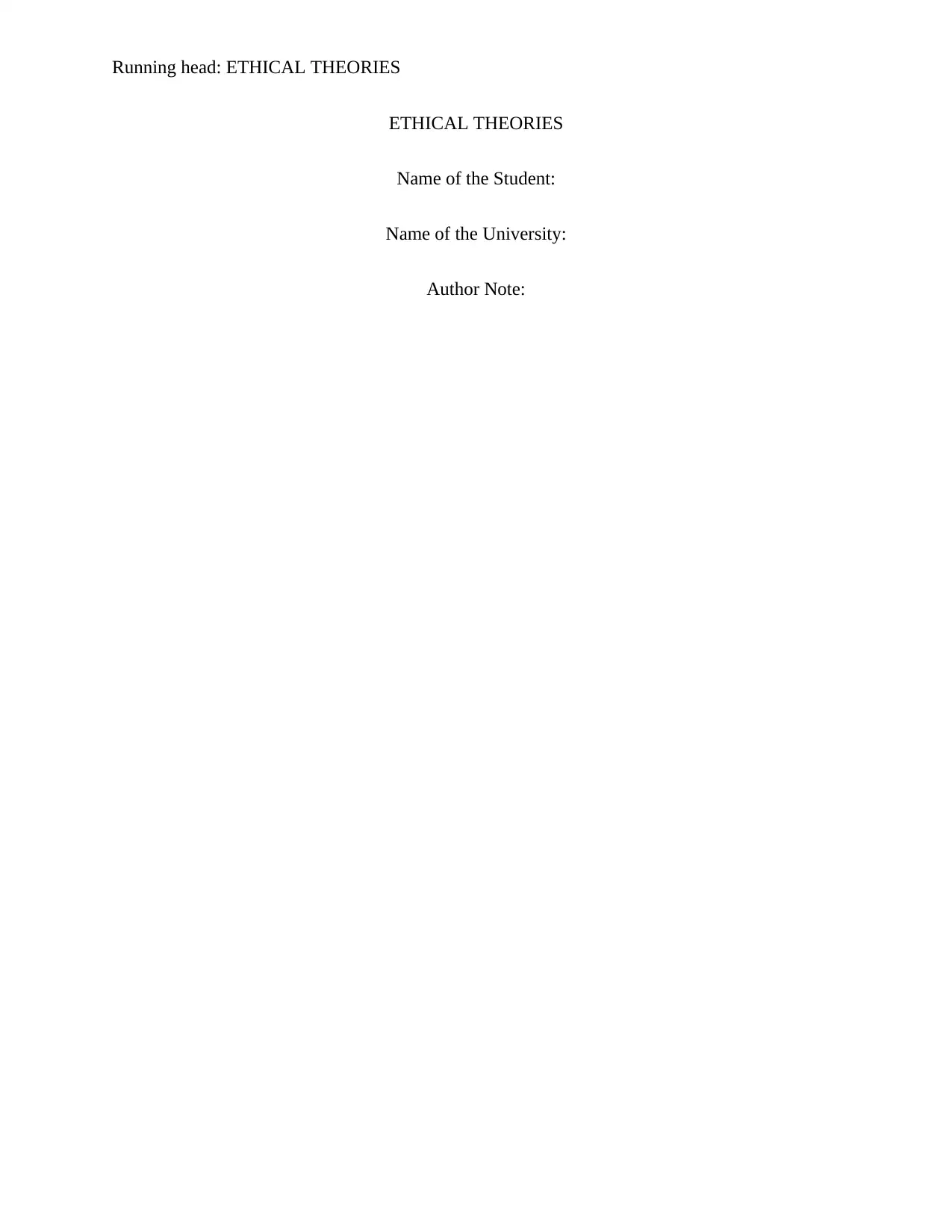
Running head: ETHICAL THEORIES
ETHICAL THEORIES
Name of the Student:
Name of the University:
Author Note:
ETHICAL THEORIES
Name of the Student:
Name of the University:
Author Note:
Secure Best Marks with AI Grader
Need help grading? Try our AI Grader for instant feedback on your assignments.
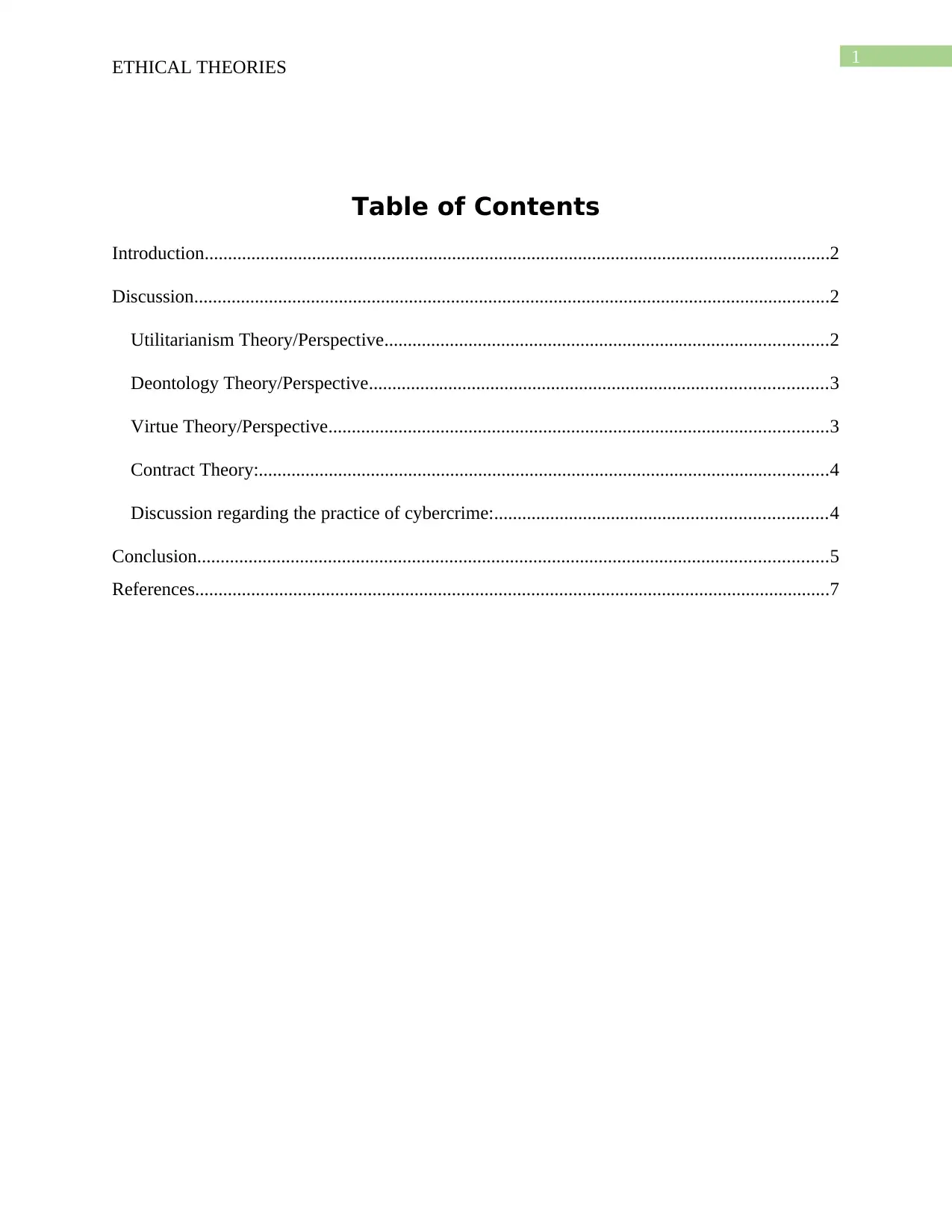
1
ETHICAL THEORIES
Table of Contents
Introduction......................................................................................................................................2
Discussion........................................................................................................................................2
Utilitarianism Theory/Perspective...............................................................................................2
Deontology Theory/Perspective..................................................................................................3
Virtue Theory/Perspective...........................................................................................................3
Contract Theory:..........................................................................................................................4
Discussion regarding the practice of cybercrime:.......................................................................4
Conclusion.......................................................................................................................................5
References........................................................................................................................................7
ETHICAL THEORIES
Table of Contents
Introduction......................................................................................................................................2
Discussion........................................................................................................................................2
Utilitarianism Theory/Perspective...............................................................................................2
Deontology Theory/Perspective..................................................................................................3
Virtue Theory/Perspective...........................................................................................................3
Contract Theory:..........................................................................................................................4
Discussion regarding the practice of cybercrime:.......................................................................4
Conclusion.......................................................................................................................................5
References........................................................................................................................................7
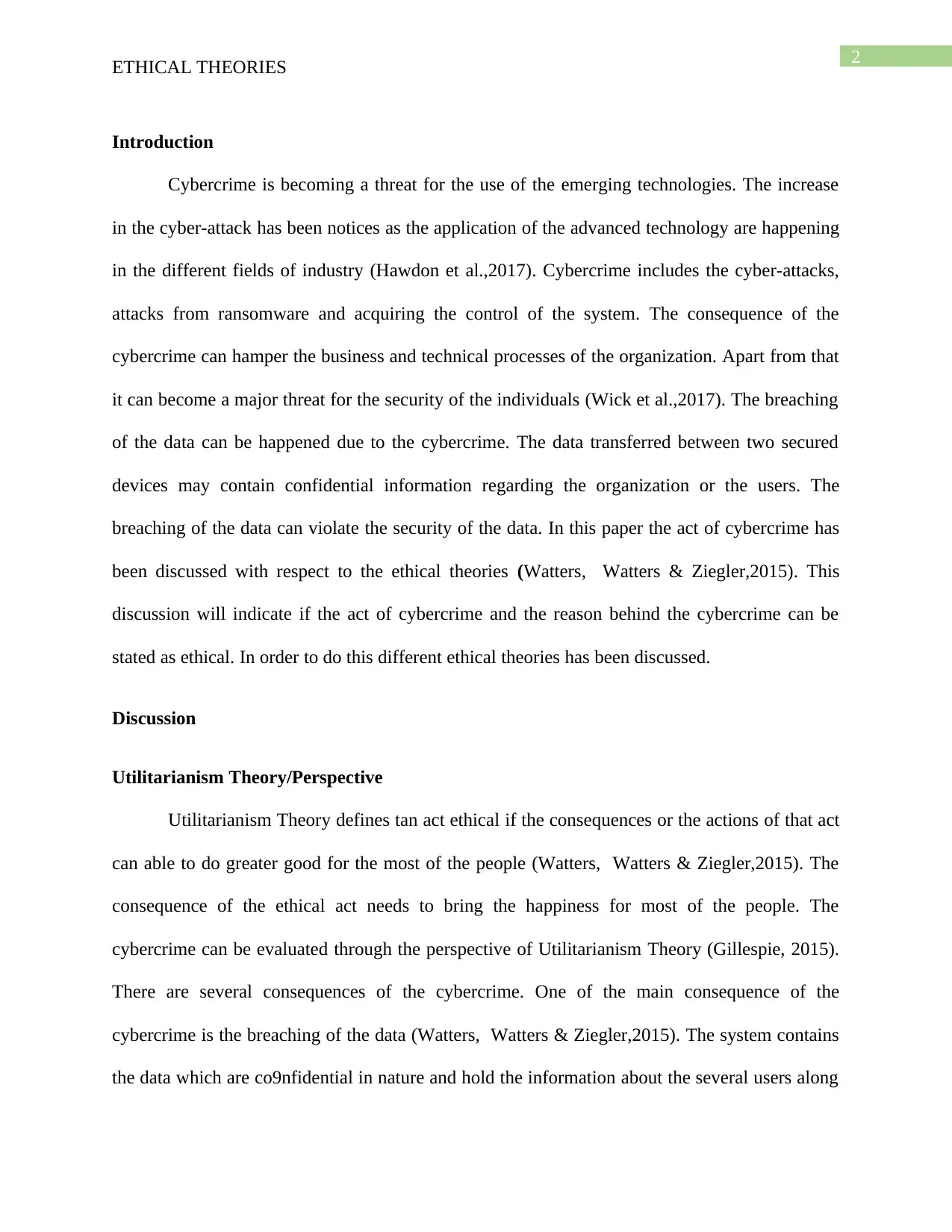
2
ETHICAL THEORIES
Introduction
Cybercrime is becoming a threat for the use of the emerging technologies. The increase
in the cyber-attack has been notices as the application of the advanced technology are happening
in the different fields of industry (Hawdon et al.,2017). Cybercrime includes the cyber-attacks,
attacks from ransomware and acquiring the control of the system. The consequence of the
cybercrime can hamper the business and technical processes of the organization. Apart from that
it can become a major threat for the security of the individuals (Wick et al.,2017). The breaching
of the data can be happened due to the cybercrime. The data transferred between two secured
devices may contain confidential information regarding the organization or the users. The
breaching of the data can violate the security of the data. In this paper the act of cybercrime has
been discussed with respect to the ethical theories (Watters, Watters & Ziegler,2015). This
discussion will indicate if the act of cybercrime and the reason behind the cybercrime can be
stated as ethical. In order to do this different ethical theories has been discussed.
Discussion
Utilitarianism Theory/Perspective
Utilitarianism Theory defines tan act ethical if the consequences or the actions of that act
can able to do greater good for the most of the people (Watters, Watters & Ziegler,2015). The
consequence of the ethical act needs to bring the happiness for most of the people. The
cybercrime can be evaluated through the perspective of Utilitarianism Theory (Gillespie, 2015).
There are several consequences of the cybercrime. One of the main consequence of the
cybercrime is the breaching of the data (Watters, Watters & Ziegler,2015). The system contains
the data which are co9nfidential in nature and hold the information about the several users along
ETHICAL THEORIES
Introduction
Cybercrime is becoming a threat for the use of the emerging technologies. The increase
in the cyber-attack has been notices as the application of the advanced technology are happening
in the different fields of industry (Hawdon et al.,2017). Cybercrime includes the cyber-attacks,
attacks from ransomware and acquiring the control of the system. The consequence of the
cybercrime can hamper the business and technical processes of the organization. Apart from that
it can become a major threat for the security of the individuals (Wick et al.,2017). The breaching
of the data can be happened due to the cybercrime. The data transferred between two secured
devices may contain confidential information regarding the organization or the users. The
breaching of the data can violate the security of the data. In this paper the act of cybercrime has
been discussed with respect to the ethical theories (Watters, Watters & Ziegler,2015). This
discussion will indicate if the act of cybercrime and the reason behind the cybercrime can be
stated as ethical. In order to do this different ethical theories has been discussed.
Discussion
Utilitarianism Theory/Perspective
Utilitarianism Theory defines tan act ethical if the consequences or the actions of that act
can able to do greater good for the most of the people (Watters, Watters & Ziegler,2015). The
consequence of the ethical act needs to bring the happiness for most of the people. The
cybercrime can be evaluated through the perspective of Utilitarianism Theory (Gillespie, 2015).
There are several consequences of the cybercrime. One of the main consequence of the
cybercrime is the breaching of the data (Watters, Watters & Ziegler,2015). The system contains
the data which are co9nfidential in nature and hold the information about the several users along
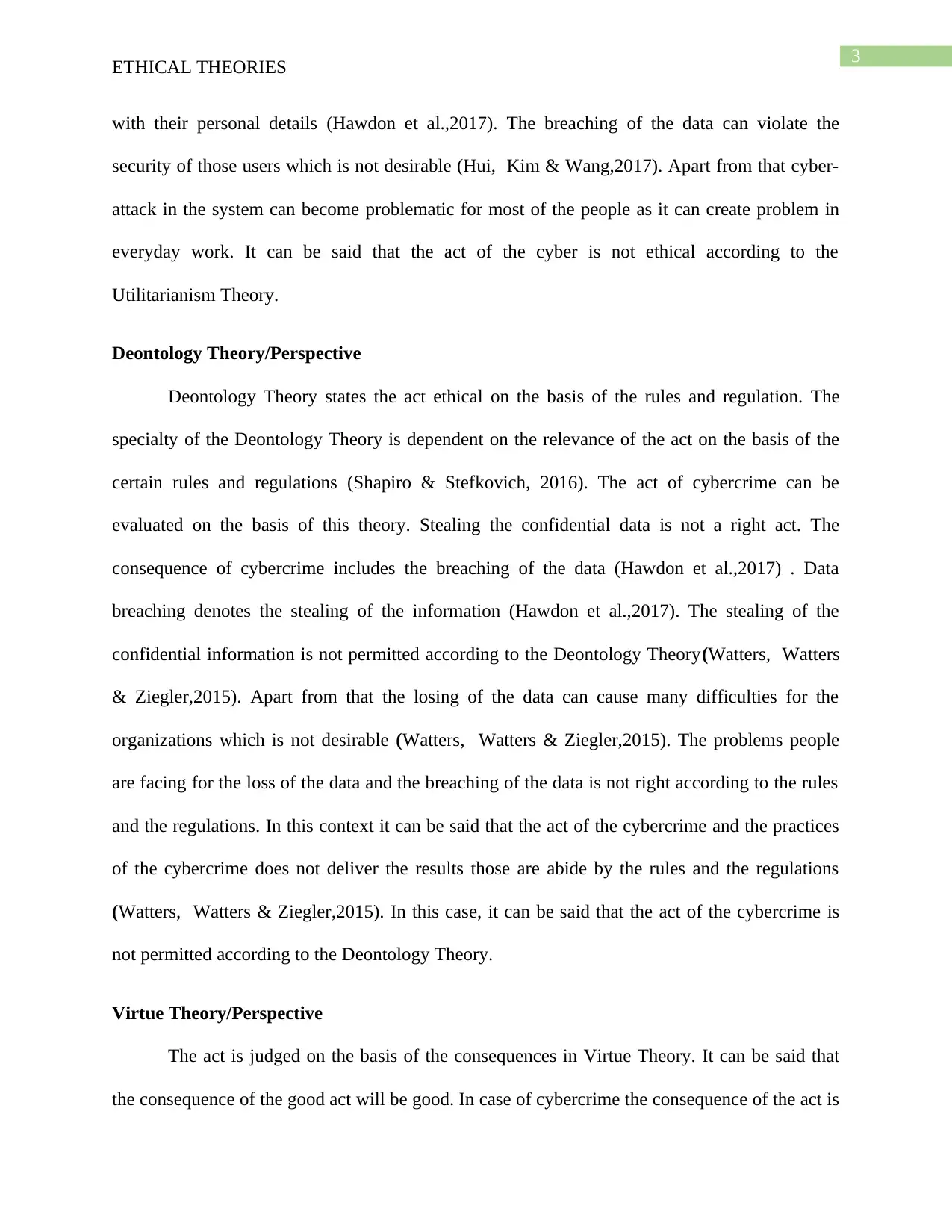
3
ETHICAL THEORIES
with their personal details (Hawdon et al.,2017). The breaching of the data can violate the
security of those users which is not desirable (Hui, Kim & Wang,2017). Apart from that cyber-
attack in the system can become problematic for most of the people as it can create problem in
everyday work. It can be said that the act of the cyber is not ethical according to the
Utilitarianism Theory.
Deontology Theory/Perspective
Deontology Theory states the act ethical on the basis of the rules and regulation. The
specialty of the Deontology Theory is dependent on the relevance of the act on the basis of the
certain rules and regulations (Shapiro & Stefkovich, 2016). The act of cybercrime can be
evaluated on the basis of this theory. Stealing the confidential data is not a right act. The
consequence of cybercrime includes the breaching of the data (Hawdon et al.,2017) . Data
breaching denotes the stealing of the information (Hawdon et al.,2017). The stealing of the
confidential information is not permitted according to the Deontology Theory(Watters, Watters
& Ziegler,2015). Apart from that the losing of the data can cause many difficulties for the
organizations which is not desirable (Watters, Watters & Ziegler,2015). The problems people
are facing for the loss of the data and the breaching of the data is not right according to the rules
and the regulations. In this context it can be said that the act of the cybercrime and the practices
of the cybercrime does not deliver the results those are abide by the rules and the regulations
(Watters, Watters & Ziegler,2015). In this case, it can be said that the act of the cybercrime is
not permitted according to the Deontology Theory.
Virtue Theory/Perspective
The act is judged on the basis of the consequences in Virtue Theory. It can be said that
the consequence of the good act will be good. In case of cybercrime the consequence of the act is
ETHICAL THEORIES
with their personal details (Hawdon et al.,2017). The breaching of the data can violate the
security of those users which is not desirable (Hui, Kim & Wang,2017). Apart from that cyber-
attack in the system can become problematic for most of the people as it can create problem in
everyday work. It can be said that the act of the cyber is not ethical according to the
Utilitarianism Theory.
Deontology Theory/Perspective
Deontology Theory states the act ethical on the basis of the rules and regulation. The
specialty of the Deontology Theory is dependent on the relevance of the act on the basis of the
certain rules and regulations (Shapiro & Stefkovich, 2016). The act of cybercrime can be
evaluated on the basis of this theory. Stealing the confidential data is not a right act. The
consequence of cybercrime includes the breaching of the data (Hawdon et al.,2017) . Data
breaching denotes the stealing of the information (Hawdon et al.,2017). The stealing of the
confidential information is not permitted according to the Deontology Theory(Watters, Watters
& Ziegler,2015). Apart from that the losing of the data can cause many difficulties for the
organizations which is not desirable (Watters, Watters & Ziegler,2015). The problems people
are facing for the loss of the data and the breaching of the data is not right according to the rules
and the regulations. In this context it can be said that the act of the cybercrime and the practices
of the cybercrime does not deliver the results those are abide by the rules and the regulations
(Watters, Watters & Ziegler,2015). In this case, it can be said that the act of the cybercrime is
not permitted according to the Deontology Theory.
Virtue Theory/Perspective
The act is judged on the basis of the consequences in Virtue Theory. It can be said that
the consequence of the good act will be good. In case of cybercrime the consequence of the act is
Secure Best Marks with AI Grader
Need help grading? Try our AI Grader for instant feedback on your assignments.
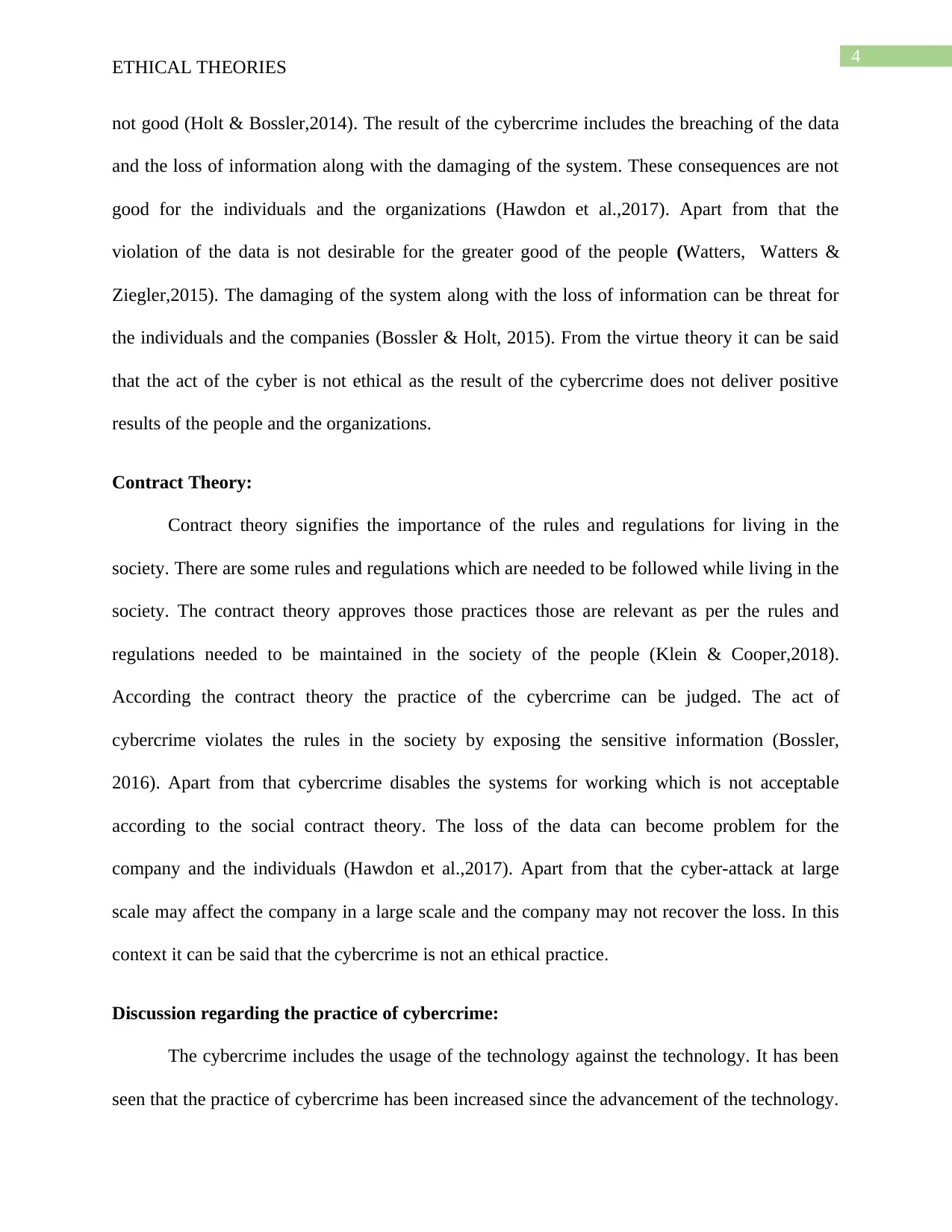
4
ETHICAL THEORIES
not good (Holt & Bossler,2014). The result of the cybercrime includes the breaching of the data
and the loss of information along with the damaging of the system. These consequences are not
good for the individuals and the organizations (Hawdon et al.,2017). Apart from that the
violation of the data is not desirable for the greater good of the people (Watters, Watters &
Ziegler,2015). The damaging of the system along with the loss of information can be threat for
the individuals and the companies (Bossler & Holt, 2015). From the virtue theory it can be said
that the act of the cyber is not ethical as the result of the cybercrime does not deliver positive
results of the people and the organizations.
Contract Theory:
Contract theory signifies the importance of the rules and regulations for living in the
society. There are some rules and regulations which are needed to be followed while living in the
society. The contract theory approves those practices those are relevant as per the rules and
regulations needed to be maintained in the society of the people (Klein & Cooper,2018).
According the contract theory the practice of the cybercrime can be judged. The act of
cybercrime violates the rules in the society by exposing the sensitive information (Bossler,
2016). Apart from that cybercrime disables the systems for working which is not acceptable
according to the social contract theory. The loss of the data can become problem for the
company and the individuals (Hawdon et al.,2017). Apart from that the cyber-attack at large
scale may affect the company in a large scale and the company may not recover the loss. In this
context it can be said that the cybercrime is not an ethical practice.
Discussion regarding the practice of cybercrime:
The cybercrime includes the usage of the technology against the technology. It has been
seen that the practice of cybercrime has been increased since the advancement of the technology.
ETHICAL THEORIES
not good (Holt & Bossler,2014). The result of the cybercrime includes the breaching of the data
and the loss of information along with the damaging of the system. These consequences are not
good for the individuals and the organizations (Hawdon et al.,2017). Apart from that the
violation of the data is not desirable for the greater good of the people (Watters, Watters &
Ziegler,2015). The damaging of the system along with the loss of information can be threat for
the individuals and the companies (Bossler & Holt, 2015). From the virtue theory it can be said
that the act of the cyber is not ethical as the result of the cybercrime does not deliver positive
results of the people and the organizations.
Contract Theory:
Contract theory signifies the importance of the rules and regulations for living in the
society. There are some rules and regulations which are needed to be followed while living in the
society. The contract theory approves those practices those are relevant as per the rules and
regulations needed to be maintained in the society of the people (Klein & Cooper,2018).
According the contract theory the practice of the cybercrime can be judged. The act of
cybercrime violates the rules in the society by exposing the sensitive information (Bossler,
2016). Apart from that cybercrime disables the systems for working which is not acceptable
according to the social contract theory. The loss of the data can become problem for the
company and the individuals (Hawdon et al.,2017). Apart from that the cyber-attack at large
scale may affect the company in a large scale and the company may not recover the loss. In this
context it can be said that the cybercrime is not an ethical practice.
Discussion regarding the practice of cybercrime:
The cybercrime includes the usage of the technology against the technology. It has been
seen that the practice of cybercrime has been increased since the advancement of the technology.
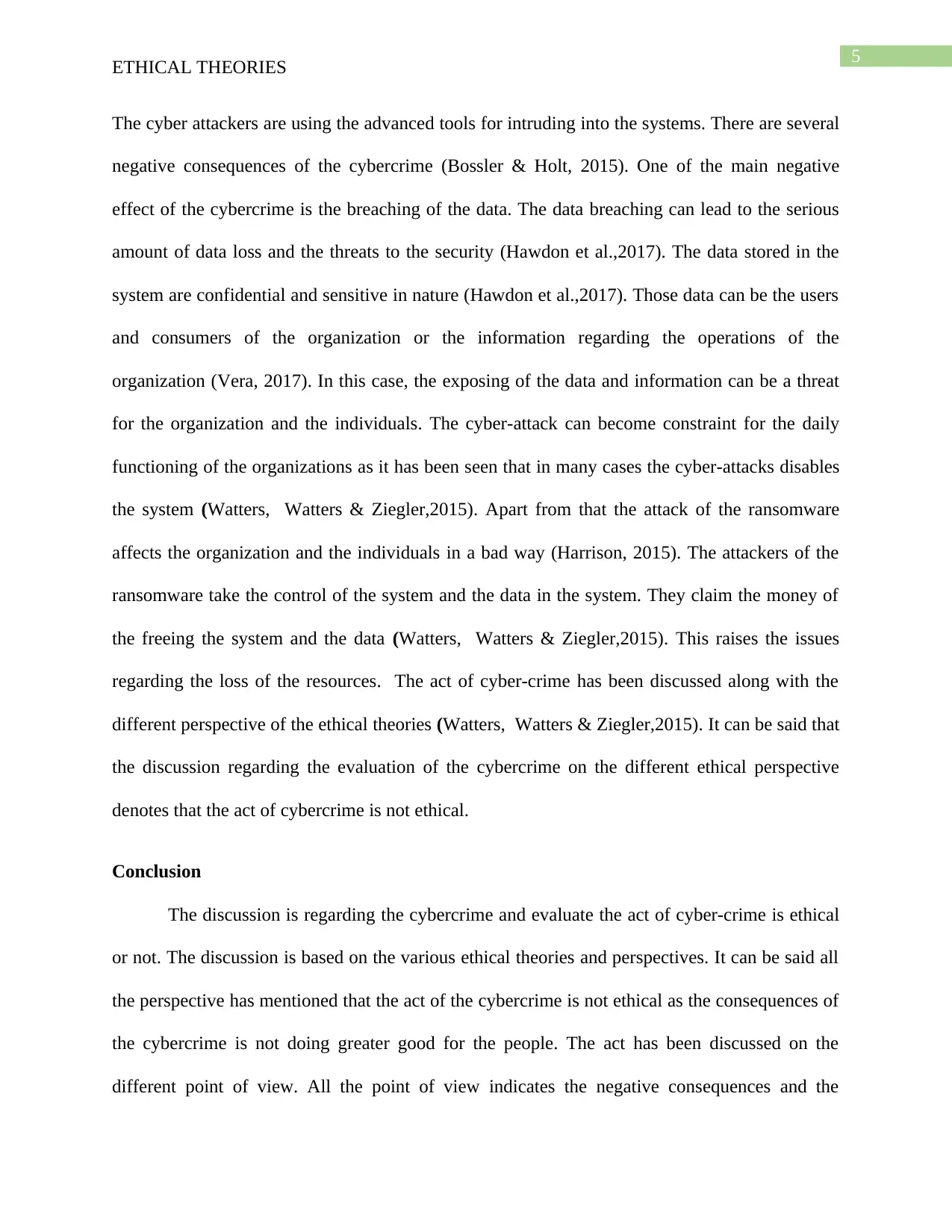
5
ETHICAL THEORIES
The cyber attackers are using the advanced tools for intruding into the systems. There are several
negative consequences of the cybercrime (Bossler & Holt, 2015). One of the main negative
effect of the cybercrime is the breaching of the data. The data breaching can lead to the serious
amount of data loss and the threats to the security (Hawdon et al.,2017). The data stored in the
system are confidential and sensitive in nature (Hawdon et al.,2017). Those data can be the users
and consumers of the organization or the information regarding the operations of the
organization (Vera, 2017). In this case, the exposing of the data and information can be a threat
for the organization and the individuals. The cyber-attack can become constraint for the daily
functioning of the organizations as it has been seen that in many cases the cyber-attacks disables
the system (Watters, Watters & Ziegler,2015). Apart from that the attack of the ransomware
affects the organization and the individuals in a bad way (Harrison, 2015). The attackers of the
ransomware take the control of the system and the data in the system. They claim the money of
the freeing the system and the data (Watters, Watters & Ziegler,2015). This raises the issues
regarding the loss of the resources. The act of cyber-crime has been discussed along with the
different perspective of the ethical theories (Watters, Watters & Ziegler,2015). It can be said that
the discussion regarding the evaluation of the cybercrime on the different ethical perspective
denotes that the act of cybercrime is not ethical.
Conclusion
The discussion is regarding the cybercrime and evaluate the act of cyber-crime is ethical
or not. The discussion is based on the various ethical theories and perspectives. It can be said all
the perspective has mentioned that the act of the cybercrime is not ethical as the consequences of
the cybercrime is not doing greater good for the people. The act has been discussed on the
different point of view. All the point of view indicates the negative consequences and the
ETHICAL THEORIES
The cyber attackers are using the advanced tools for intruding into the systems. There are several
negative consequences of the cybercrime (Bossler & Holt, 2015). One of the main negative
effect of the cybercrime is the breaching of the data. The data breaching can lead to the serious
amount of data loss and the threats to the security (Hawdon et al.,2017). The data stored in the
system are confidential and sensitive in nature (Hawdon et al.,2017). Those data can be the users
and consumers of the organization or the information regarding the operations of the
organization (Vera, 2017). In this case, the exposing of the data and information can be a threat
for the organization and the individuals. The cyber-attack can become constraint for the daily
functioning of the organizations as it has been seen that in many cases the cyber-attacks disables
the system (Watters, Watters & Ziegler,2015). Apart from that the attack of the ransomware
affects the organization and the individuals in a bad way (Harrison, 2015). The attackers of the
ransomware take the control of the system and the data in the system. They claim the money of
the freeing the system and the data (Watters, Watters & Ziegler,2015). This raises the issues
regarding the loss of the resources. The act of cyber-crime has been discussed along with the
different perspective of the ethical theories (Watters, Watters & Ziegler,2015). It can be said that
the discussion regarding the evaluation of the cybercrime on the different ethical perspective
denotes that the act of cybercrime is not ethical.
Conclusion
The discussion is regarding the cybercrime and evaluate the act of cyber-crime is ethical
or not. The discussion is based on the various ethical theories and perspectives. It can be said all
the perspective has mentioned that the act of the cybercrime is not ethical as the consequences of
the cybercrime is not doing greater good for the people. The act has been discussed on the
different point of view. All the point of view indicates the negative consequences and the
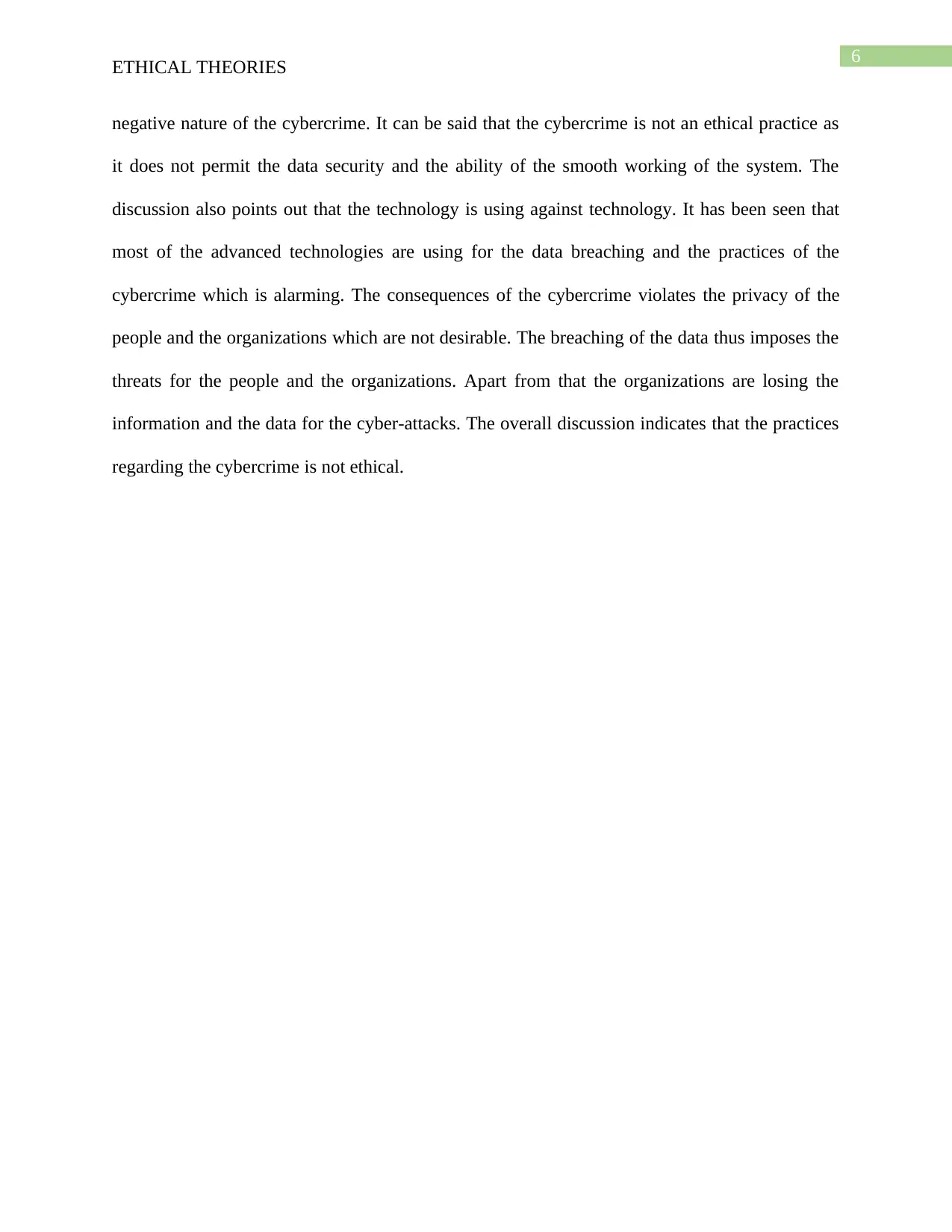
6
ETHICAL THEORIES
negative nature of the cybercrime. It can be said that the cybercrime is not an ethical practice as
it does not permit the data security and the ability of the smooth working of the system. The
discussion also points out that the technology is using against technology. It has been seen that
most of the advanced technologies are using for the data breaching and the practices of the
cybercrime which is alarming. The consequences of the cybercrime violates the privacy of the
people and the organizations which are not desirable. The breaching of the data thus imposes the
threats for the people and the organizations. Apart from that the organizations are losing the
information and the data for the cyber-attacks. The overall discussion indicates that the practices
regarding the cybercrime is not ethical.
ETHICAL THEORIES
negative nature of the cybercrime. It can be said that the cybercrime is not an ethical practice as
it does not permit the data security and the ability of the smooth working of the system. The
discussion also points out that the technology is using against technology. It has been seen that
most of the advanced technologies are using for the data breaching and the practices of the
cybercrime which is alarming. The consequences of the cybercrime violates the privacy of the
people and the organizations which are not desirable. The breaching of the data thus imposes the
threats for the people and the organizations. Apart from that the organizations are losing the
information and the data for the cyber-attacks. The overall discussion indicates that the practices
regarding the cybercrime is not ethical.
Paraphrase This Document
Need a fresh take? Get an instant paraphrase of this document with our AI Paraphraser
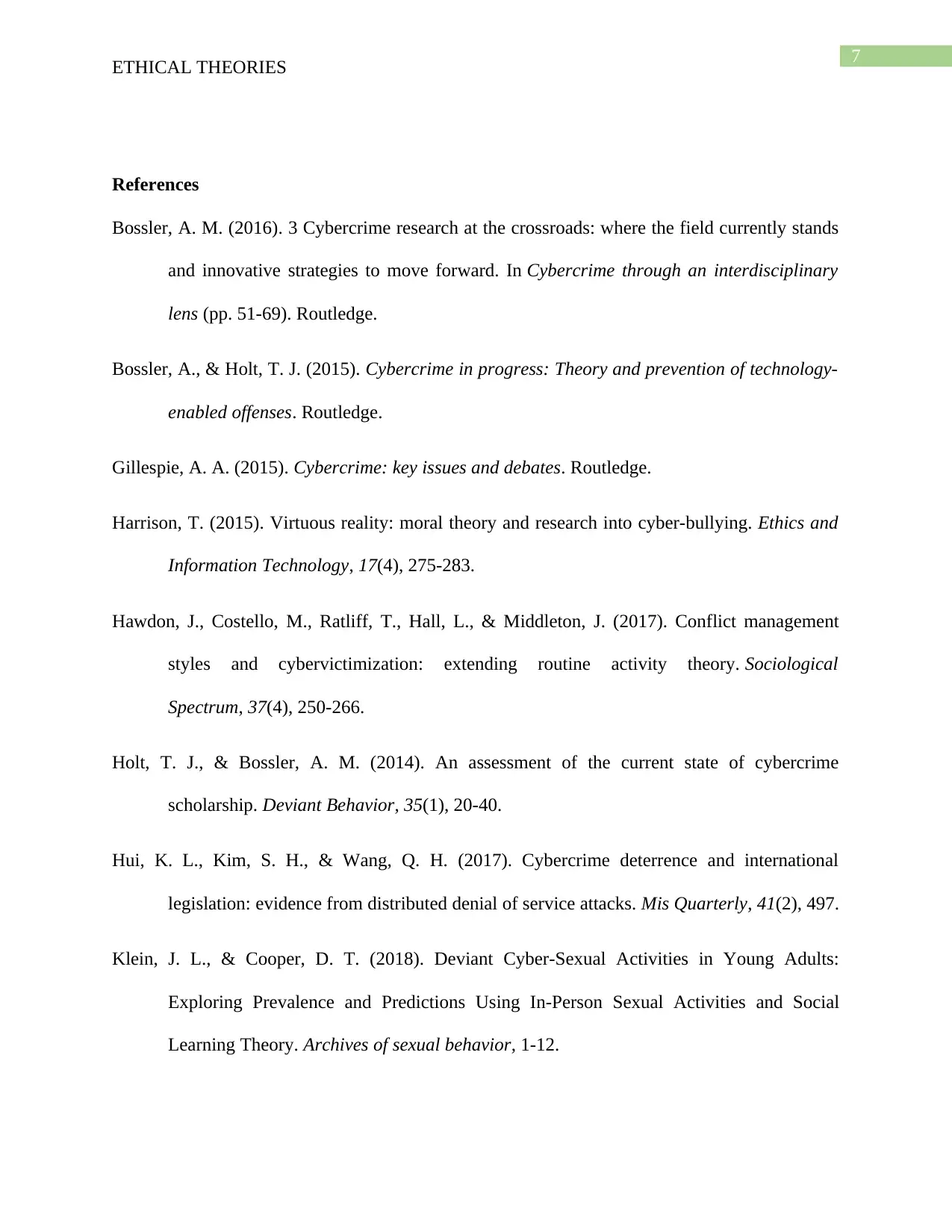
7
ETHICAL THEORIES
References
Bossler, A. M. (2016). 3 Cybercrime research at the crossroads: where the field currently stands
and innovative strategies to move forward. In Cybercrime through an interdisciplinary
lens (pp. 51-69). Routledge.
Bossler, A., & Holt, T. J. (2015). Cybercrime in progress: Theory and prevention of technology-
enabled offenses. Routledge.
Gillespie, A. A. (2015). Cybercrime: key issues and debates. Routledge.
Harrison, T. (2015). Virtuous reality: moral theory and research into cyber-bullying. Ethics and
Information Technology, 17(4), 275-283.
Hawdon, J., Costello, M., Ratliff, T., Hall, L., & Middleton, J. (2017). Conflict management
styles and cybervictimization: extending routine activity theory. Sociological
Spectrum, 37(4), 250-266.
Holt, T. J., & Bossler, A. M. (2014). An assessment of the current state of cybercrime
scholarship. Deviant Behavior, 35(1), 20-40.
Hui, K. L., Kim, S. H., & Wang, Q. H. (2017). Cybercrime deterrence and international
legislation: evidence from distributed denial of service attacks. Mis Quarterly, 41(2), 497.
Klein, J. L., & Cooper, D. T. (2018). Deviant Cyber-Sexual Activities in Young Adults:
Exploring Prevalence and Predictions Using In-Person Sexual Activities and Social
Learning Theory. Archives of sexual behavior, 1-12.
ETHICAL THEORIES
References
Bossler, A. M. (2016). 3 Cybercrime research at the crossroads: where the field currently stands
and innovative strategies to move forward. In Cybercrime through an interdisciplinary
lens (pp. 51-69). Routledge.
Bossler, A., & Holt, T. J. (2015). Cybercrime in progress: Theory and prevention of technology-
enabled offenses. Routledge.
Gillespie, A. A. (2015). Cybercrime: key issues and debates. Routledge.
Harrison, T. (2015). Virtuous reality: moral theory and research into cyber-bullying. Ethics and
Information Technology, 17(4), 275-283.
Hawdon, J., Costello, M., Ratliff, T., Hall, L., & Middleton, J. (2017). Conflict management
styles and cybervictimization: extending routine activity theory. Sociological
Spectrum, 37(4), 250-266.
Holt, T. J., & Bossler, A. M. (2014). An assessment of the current state of cybercrime
scholarship. Deviant Behavior, 35(1), 20-40.
Hui, K. L., Kim, S. H., & Wang, Q. H. (2017). Cybercrime deterrence and international
legislation: evidence from distributed denial of service attacks. Mis Quarterly, 41(2), 497.
Klein, J. L., & Cooper, D. T. (2018). Deviant Cyber-Sexual Activities in Young Adults:
Exploring Prevalence and Predictions Using In-Person Sexual Activities and Social
Learning Theory. Archives of sexual behavior, 1-12.
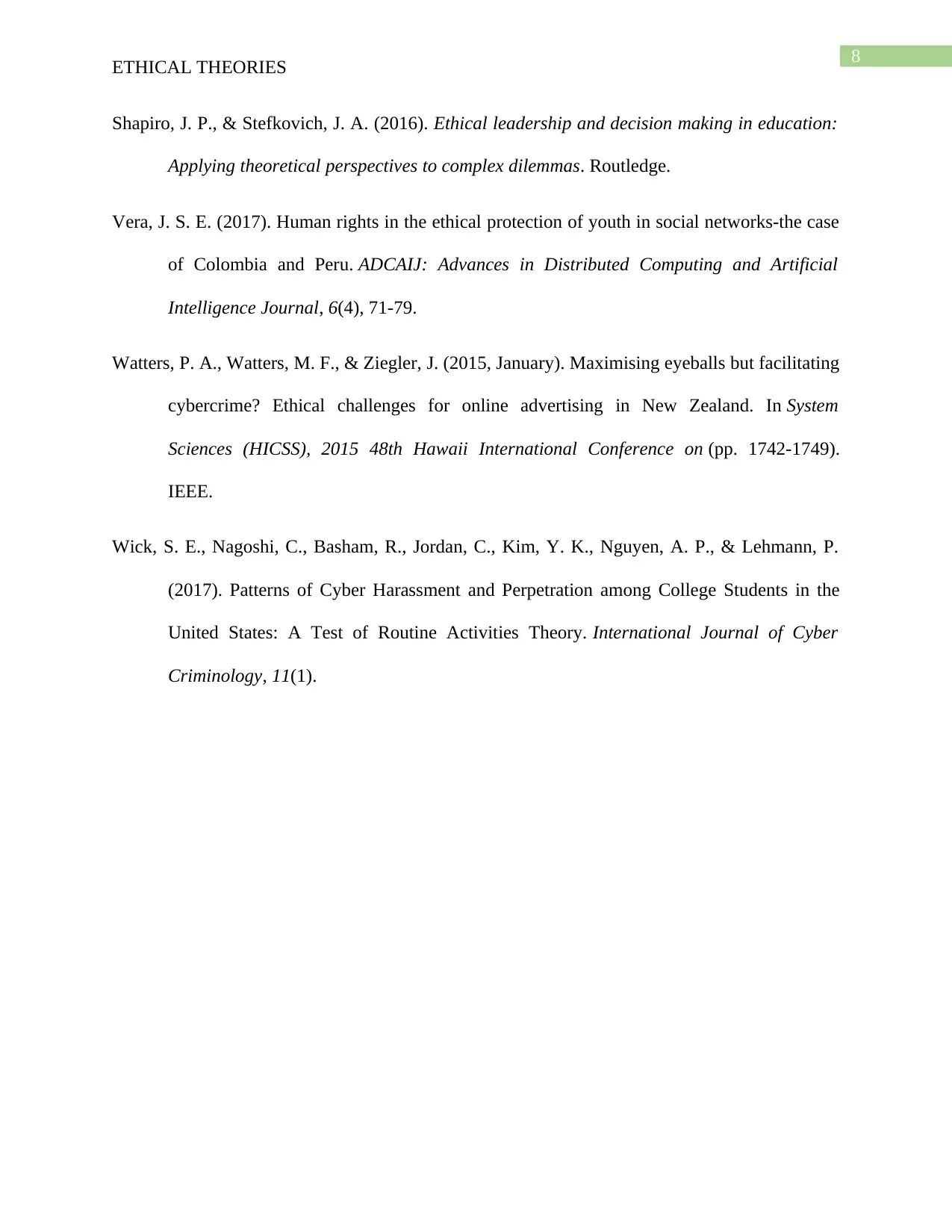
8
ETHICAL THEORIES
Shapiro, J. P., & Stefkovich, J. A. (2016). Ethical leadership and decision making in education:
Applying theoretical perspectives to complex dilemmas. Routledge.
Vera, J. S. E. (2017). Human rights in the ethical protection of youth in social networks-the case
of Colombia and Peru. ADCAIJ: Advances in Distributed Computing and Artificial
Intelligence Journal, 6(4), 71-79.
Watters, P. A., Watters, M. F., & Ziegler, J. (2015, January). Maximising eyeballs but facilitating
cybercrime? Ethical challenges for online advertising in New Zealand. In System
Sciences (HICSS), 2015 48th Hawaii International Conference on (pp. 1742-1749).
IEEE.
Wick, S. E., Nagoshi, C., Basham, R., Jordan, C., Kim, Y. K., Nguyen, A. P., & Lehmann, P.
(2017). Patterns of Cyber Harassment and Perpetration among College Students in the
United States: A Test of Routine Activities Theory. International Journal of Cyber
Criminology, 11(1).
ETHICAL THEORIES
Shapiro, J. P., & Stefkovich, J. A. (2016). Ethical leadership and decision making in education:
Applying theoretical perspectives to complex dilemmas. Routledge.
Vera, J. S. E. (2017). Human rights in the ethical protection of youth in social networks-the case
of Colombia and Peru. ADCAIJ: Advances in Distributed Computing and Artificial
Intelligence Journal, 6(4), 71-79.
Watters, P. A., Watters, M. F., & Ziegler, J. (2015, January). Maximising eyeballs but facilitating
cybercrime? Ethical challenges for online advertising in New Zealand. In System
Sciences (HICSS), 2015 48th Hawaii International Conference on (pp. 1742-1749).
IEEE.
Wick, S. E., Nagoshi, C., Basham, R., Jordan, C., Kim, Y. K., Nguyen, A. P., & Lehmann, P.
(2017). Patterns of Cyber Harassment and Perpetration among College Students in the
United States: A Test of Routine Activities Theory. International Journal of Cyber
Criminology, 11(1).
1 out of 9
Related Documents
Your All-in-One AI-Powered Toolkit for Academic Success.
+13062052269
info@desklib.com
Available 24*7 on WhatsApp / Email
![[object Object]](/_next/static/media/star-bottom.7253800d.svg)
Unlock your academic potential
© 2024 | Zucol Services PVT LTD | All rights reserved.





